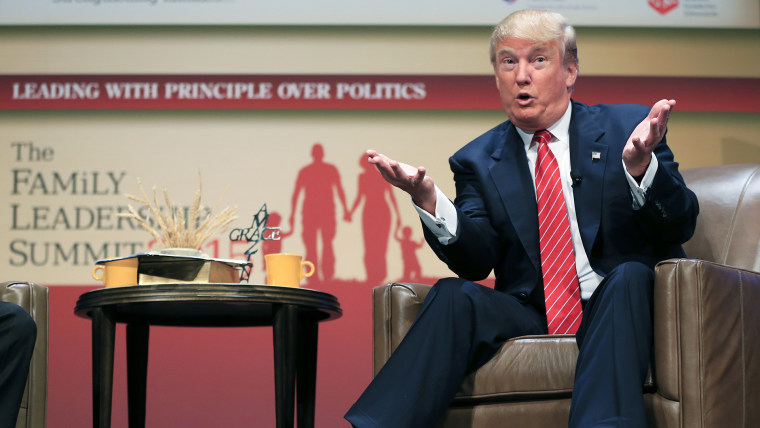It seems almost comical in hindsight. Last summer, Republicans were so excited about the possibility of winning back the White House -- a scenario many in the party saw as a near certainty -- that 17 candidates threw their hat in the ring. The dominant phrase in political media at the time was "deep bench."
And under the circumstances, it seemed like a fair assessment. The massive GOP field, larger than anything in modern American history, featured enough current and former governors to field a baseball team. Add to the mix several high-profile senators and a picture soon emerged of a political party stacked with talented candidates, one of whom stood a good chance of becoming the Leader of the Free World in January 2017.
In time, the 17-member field steadily shrunk, and for the last couple of months, Republican voters had three finalists to choose from. Last night, Ted Cruz bowed out, and this afternoon, John Kasich will reportedly do the same.
After over a year of campaigning, 16 of the 17 Republican presidential hopefuls exited the stage. The last man standing is the candidate who's led in nearly every national GOP poll since the 4th of July. His name is Donald Trump.
Yes, this is really happening. You're not stuck in a weird dream. Everyone who assumed that something would eventually derail Trump, and there was simply no way a major American party would nominate a nativist, demagogic reality-show host as their presidential candidate, was wrong. It feels weird and oddly disconcerting to type the words "Republican Party presidential nominee Donald Trump," but the party's voters have spoken.
This may be a collectively scary moment for the nation, but it's nevertheless real.
In the coming months, Trump's presidential candidacy will be examined from every possible angle, starting with whether or not he's actually likely to be elected. By any fair measure, the Republican nominee starts as an underdog: Trump is one of the least popular figures in American public life, and there's no precedent for a major party nominating someone so widely disliked by voters.
There's also the inconvenient matter of Trump’s lack of relevant skills, experience, scruples, knowledge, and appropriate temperament. Never before has a major American political party nominated someone so manifestly unprepared for the nation's most powerful office.
But as the dust settles on the GOP's nominating process, it's worth pausing to think about the state of the Republican Party itself.
Last summer, the University of Virginia's Larry Sabato, a prominent political scientist, co-authored a piece on Trump's electoral prospects. "If Trump is nominated," the analysis said, "then everything we think we know about presidential nominations is wrong."
Around the same time, FiveThirtyEight's Nate Silver and Harry Enten made projections as to who's likely to prevail in the race for the GOP nomination. Silver gave Donald Trump a 2% chance. His colleague saw that as far too generous: Enten put Trump's chances at -10%.
My point, of course, is not to pick on Sabato, Silver, or Enten, each of whom does excellent work. Rather, the point is much of the political world thinks of the contemporary Republican Party as a normal, mainstream, conservative party that operates more or less by the same rules and norms as the party has relied on for generations.
It's not. Today's radicalized Republican Party isn't normal. It's something new.
I've long believed one of the most important pieces of political commentary of the last decade came by way of Norm Ornstein and Thomas Mann, who wrote "It's Even Worse Than It Looks," and who warned us exactly four years ago last week.
We have been studying Washington politics and Congress for more than 40 years, and never have we seen them this dysfunctional. In our past writings, we have criticized both parties when we believed it was warranted. Today, however, we have no choice but to acknowledge that the core of the problem lies with the Republican Party. The GOP has become an insurgent outlier in American politics. It is ideologically extreme; scornful of compromise; unmoved by conventional understanding of facts, evidence and science; and dismissive of the legitimacy of its political opposition. When one party moves this far from the mainstream, it makes it nearly impossible for the political system to deal constructively with the country's challenges.
In the four years since this was published, Republican politics has only grown more extreme -- to the point that Donald Trump can fairly easily win the party's presidential nomination running on a post-policy platform of racially-charged resentment.
In some GOP circles, it's become fashionable to characterize Republican voters as victims of Trump's elaborate con. Their 2016 nominee may have prevailed, the argument goes, but that's because he's a capable snake-oil salesman, obscuring his corruption and incompetence with compelling slogans and marketing.
What this fails to address is what this says about the party itself. A great political party, competing for votes in the world's greatest superpower, shouldn't be vulnerable to developments like these in the first place. Yes, Trump has taken over, but the question Republicans should ask themselves is how he was able to do so with such ease.
Trump may be a con man, as Marco Rubio labeled him months ago, but he was able to pull this off because of the conditions in which he found the party when he launched his campaign.
Not to put too fine a point on this, but Donald Trump didn't break the Republican Party. It was broken before he even started, making it easy for him to exploit the wreckage for his own purposes.
